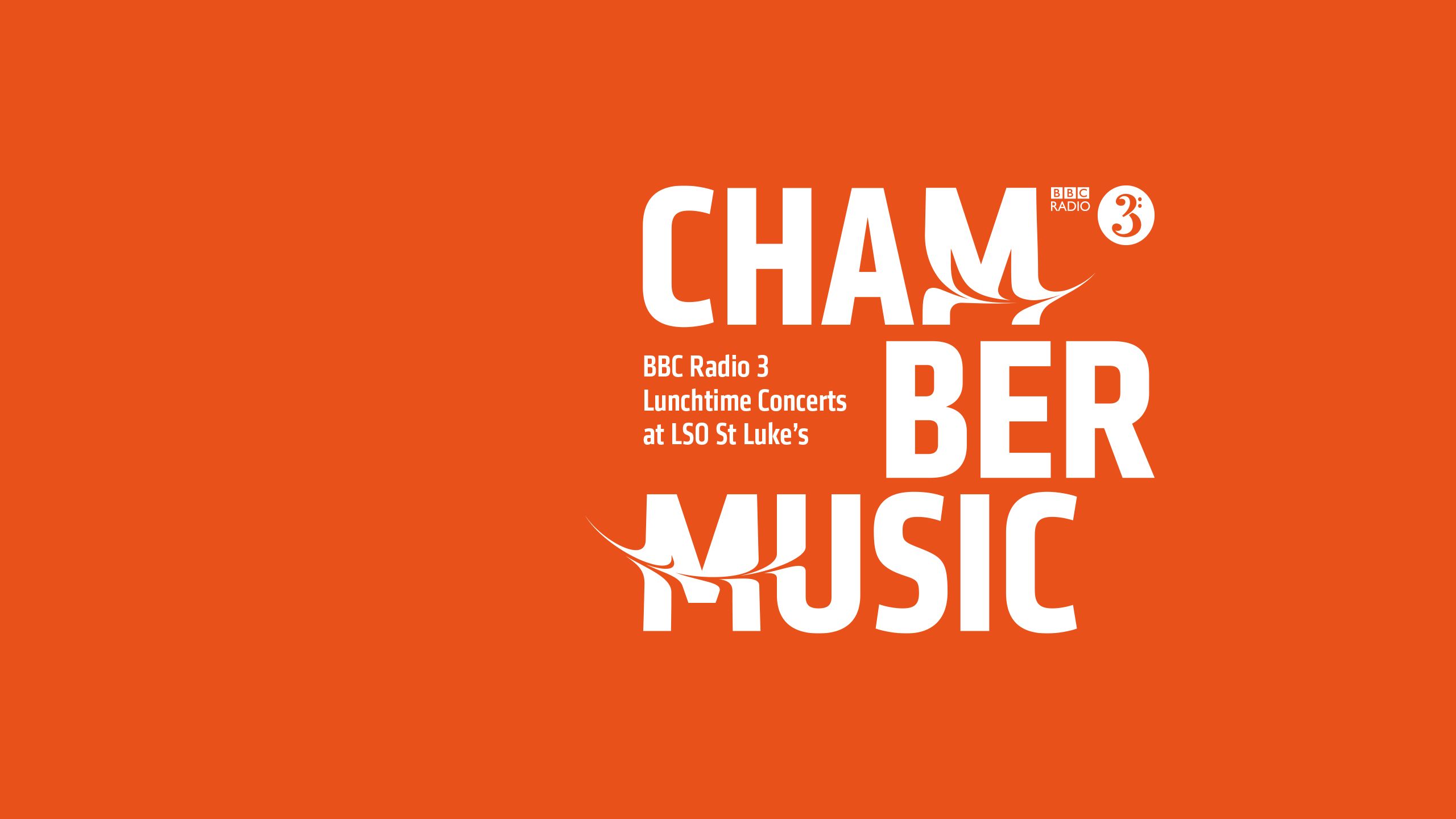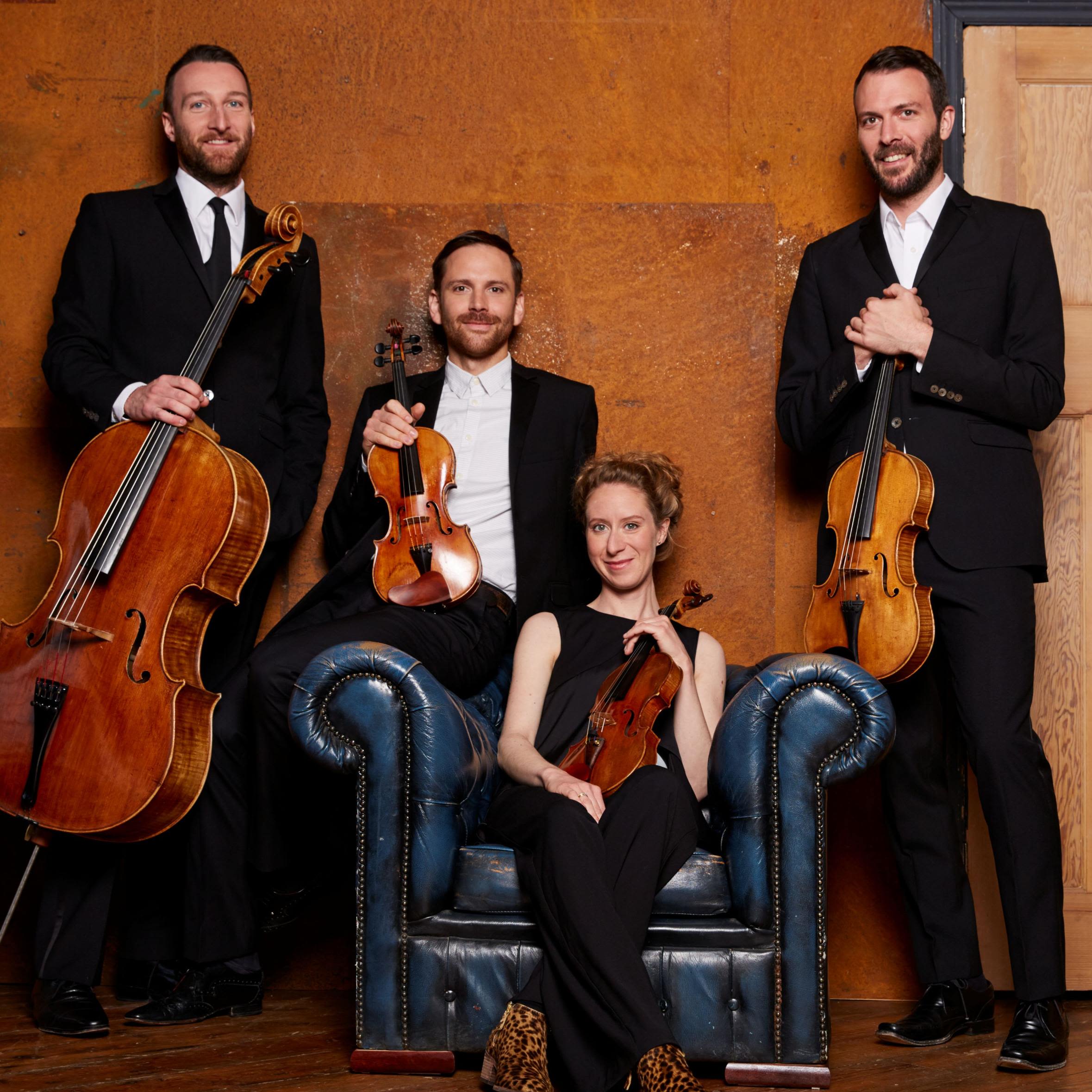
Friday 25 September 1pm
BBC Radio 3 Lunchtime Concert
Heath Quartet: Brahms and Beyond
Berg String Quartet
Brahms String Quartet No 2
Heath Quartet
Oliver Heath violin
Sara Wolstenholme violin
Gary Pomeroy viola
Christopher Murray cello
Visit our website for information on how we are ensuring activity at our venue LSO St Luke’s is COVID-19 secure.
Recorded for future broadcast by BBC Radio 3.
The support of our audience has truly never been more important for LSO St Luke's and the LSO's world-class artistic programme. By supporting us now and in the months to come, you will help us to continue to adapt our music-making and activities to meet the challenges of these times, including sharing the gift of music with our local communities through our LSO Discovery programme.
About 'Brahms and Beyond'
Traditionalist or innovator? Classicist or Romantic? Brahms stood with one foot in the past and one in the future, a figure whose music would influence generations of composers, and echo in the work that would follow.
In this series, we explore Brahms’ most extraordinary works for chamber ensemble, compositions by his friends and contemporaries, and music by Mahler, Berg and other later composers which bear the trace of his influence.
Ahead of the concert, we asked the Quartet how it feels to resume live performances together, and what the music they've selected means to them.
'This will be only the second time since March that we walk out on stage together, so it is a special occasion. Juxtaposing these two amazing pieces highlights the interesting lineage from Brahms to Berg via his teacher Schoenberg, who called Brahms 'The Progressive.' We think listeners will get a keen sense of how both composers emphasised clarity of structure, as well as the importance of small motifs within the larger picture – the music's 'inner life'.'
Read the full interview on the LSO blog.
Alban Berg
String Quartet
1910

1. Langsam
2. Mäßige Viertel
It may not be initially obvious from listening to Berg’s String Quartet but, as the concert series’ title ‘Brahms and Beyond’ implies, Brahms was a big influence on the Austrian composer, especially in his younger years. Hearing today’s two quartets back-to-back helps highlight Brahms’ guiding hand: both works are dense and highly expressive, and use themes and motifs, in Berg’s case, based on the dramatic opening notes on the violin.
But we are certainly in the ‘beyond Brahms’ territory. There are obvious differences: unusually the Quartet is in just two movements, rather than four, and even more surprising is its lack of key signature. Despite this, it is still considered to be tonal as opposed to the atonal qualities of his teacher Schoenberg’s music of the time. The Quartet is a heady mix of the emotional impact of a Romantic Brahms and experimentation. The recipe worked: Berg’s Quartet was (eventually) positively received, and became Berg’s first big success as well as the foundation stone of the Second Viennese School of which Berg was the shining light.
Note by Sarah Breeden
Alban Berg
1885–1935

Although piano lessons formed part of Berg’s general education, the boy showed few signs of exceptional talent for music. He struggled to pass his final exams at the Vienna Gymnasium, preferring to learn directly of new trends in art, literature, music and architecture from friends such as Oskar Kokoschka, Gustav Klimt and Adolf Loos.
On graduating from school, Berg accepted a post as a local government official, but in October 1904 was inspired by a newspaper advertisement to study composition with Arnold Schoenberg. He studied for six years with Schoenberg, who remained his close friend and mentor. During this time Schoenberg evolved a new approach to composing, gradually moving away from the norms of tonal harmony.
In 1910 Berg completed his String Quartet, in which he revealed an independent creative flair. Berg’s self-confidence
grew with the composition of several miniature works and, in 1914, the large-scale Three Pieces for Orchestra. Service with the Austrian Imperial Army during World War One did not completely halt Berg’s output; indeed, he began his first opera, Wozzeck, in the summer of 1917. The work was premiered at the Berlin Staatsoper in December 1925 and, despite hostile early criticism, has since entered the international repertoire. As an innovative composer, Berg successfully married atonality – and, later, a harmonic and melodic language based on the use of all 12 tones of the chromatic scale – with forms from the past. Traces of popular music also surface in his works, notably so in his opera Lulu (1929–35), a powerful tale of immorality, completed from the composer’s sketches only after the death of his widow in 1976. Berg himself died of septicaemia, almost certainly caused by complications following an insect bite.
Profile by Andrew Stewart
Johannes Brahms
String Quartet No 2
1873

1. Allegro non troppo
2. Andante moderato
3. Quasi Minuetto, moderato
4. Finale: Allegro non assai
Sometimes we stall at starting something if we think it’s already been done and can’t be bettered. Why bother writing a novel when it’s been done brilliantly so many times already? This seems to have Brahms’ trouble with string quartets. Feeling the behemoth Beethoven breathing down his neck, not to mention quartet stalwarts Mozart and Schubert, had tightened the reins on creative flow, and it took him 20 years and various re-writes before Brahms would let his first two string quartets out in public. Puzzling behaviour for such a glittering composer of chamber music: in fact, he had written a number of quartets but the manuscripts’ perfunctory fate was to end up as Brahms’ wallpaper. But he needn’t have worried: the quartets went on to inspire many, including Berg and his teacher Schoenberg.
Rich and sonorous, the first movement of the Second Quartet uses themes and motifs throughout its four movements, based on the notes F–A–E and F–A–F, a consciously warm offering to his great friend Joseph Joachim whose motto was ‘Frei, aber einsam’ (Free, but lonely). Brahms replied with ‘Frei, aber froh’ (Free, but glad). Berg’s teacher Schoenberg particularly loved the intricate magical second movement. The third movement takes the form of a rather forlorn minuet, while the fourth embraces wild Magyar folk music of Hungary.
Note written by Sarah Breeden
Johannes Brahms
1833–97

Showing early musical promise, the young Johannes Brahms supplemented his parents’ meagre income by playing in the bars and brothels of Hamburg’s infamous red-light district. In 1853 he presented himself to Robert Schumann in Düsseldorf, winning unqualified approval from the older composer. Brahms fell in love with Schumann’s wife, Clara, supporting her after her husband’s illness and death. The relationship did not develop as Brahms wished, and he returned to Hamburg; their close friendship, however, survived.
In 1862 Brahms moved to Vienna where he found fame as a conductor, pianist and composer. The Leipzig premiere of his German Requiem in 1869 proved a triumph, with subsequent performances establishing Brahms as one of the emerging German nation’s foremost composers. Following the long-delayed completion of his First Symphony in 1876, he composed in quick succession the majestic Violin Concerto, the two piano Rhapsodies, the First Violin Sonata in G major and the Second Symphony. His subsequent association with the much-admired court orchestra in Meinigen allowed him freedom to experiment and develop new ideas, the relationship crowned by the Fourth Symphony of 1884.
Profile by Andrew Stewart
Artist Biographies

Heath Quartet
Oliver Heath violin
Sara Wolstenholme violin
Gary Pomeroy viola
Christopher Murray cello

The charismatic and sought-after Heath Quartet won the 2016 Gramophone Chamber Award for their recording of the complete string quartets of Sir Michael Tippett, and in May 2013 became the first ensemble in 15 years to win the prestigious Royal Philharmonic Society’s Young Artists Award. Formed in 2002 at the Royal Northern College of Music they were selected for representation by YCAT, awarded a Borletti-Buitoni Special Ensemble Scholarship and in 2012 won the Ensemble Prize at the Festspiele Mecklenburg-Vorpommern, where they are now regular visitors.
Following their award-winning debut recording of Tippett, the quartet recorded two discs featuring Tchaikovsky’s first and third quartets and the complete Bartók quartets, the latter being shortlisted for the 2018 Gramophone Chamber Award and the winner of the 2017 Limelight Chamber Recording of the Year award.
Notable performances of previous seasons have included the world premiere of a John Tavener piece at the BBC Proms, concerts at the Beethovenfest Bonn, their debuts at the Musée d’Orsay and Louvre Auditorium in Paris and the World Premiere of Dobrinka Tabakova’s Highland Pastorale performed at their Cheltenham Festival debut. In 2018 they made their debut tour of New Zealand. In the UK, they have performed at the Barbican, Bridgewater Hall, Sage Gateshead, Perth Concert Hall and Queen’s Hall Edinburgh.
Strong exponents of contemporary music, the quartet have also worked with several leading composers including Hans Abrahamsen, Helen Grime, Louis Andriessen, Brett Dean, Anthony Gilbert, Sofia Gubaidulina, Steven Mackey and John Musto. They took part in the European premiere of Steve Mackey’s Gaggle and Flock for string octet, the world premiere of John Musto’s Another Place with Carolyn Sampson at Wigmore Hall, and received unanimous critical acclaim for their performance of Ligeti’s Quartet No 2 and Thomas Ades’ Arcadiana at the Purcell Room.
Thank You for Joining Us
The support of our audience has truly never been more important. You can help us to continue to adapt our music-making and activities to meet the challenges of these times.
You can also donate now via text.
Text LSOAUTUMN 5, LSOAUTUMN 10 or LSOAUTUMN 20 to 70085 to donate £5, £10 or £20.
Texts cost £5, £10 or £20 plus one standard rate message and you’ll be opting in to hear more about our work and fundraising via telephone and SMS. If you’d like to give but do not wish to receive marketing communications, text LSOAUTUMNNOINFO 5, 10 or 20 to 70085. UK numbers only.
Thank you.
Keep Exploring
- Subscribe to our YouTube channel, where you can watch over 500 videos, including new music released every Sunday.
- Follow us on Facebook, Instagram and Twitter for quizzes, listening suggestions and more.
- Find us on Apple Music to listen to all our recordings.
- Sign up to our email list to be the first to hear about our latest news and programmes.
Keep scrolling for details of our next BBC Radio 3 concert...
Friday 2 October 1pm
Brahms and Beyond
Brahms Intermezzo in B-flat minor Op 117 No 2
Schoenberg Klavierstücke Nos 1 and 2 from Fünf Klavierstücke Op 23
Berg Piano Sonata
Webern Variations for piano
Brahms Piano Sonata No 1
Peter Donohoe piano

